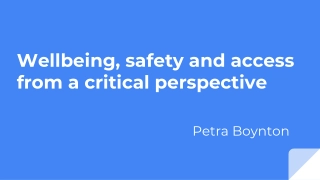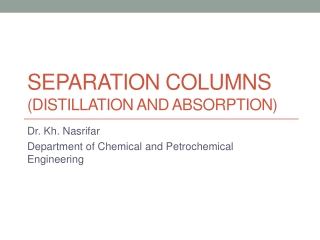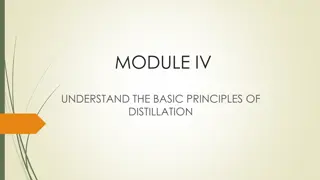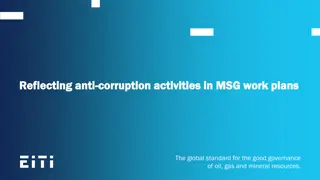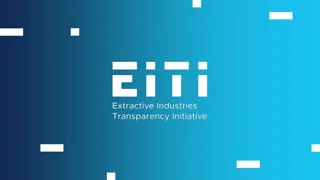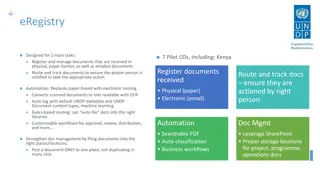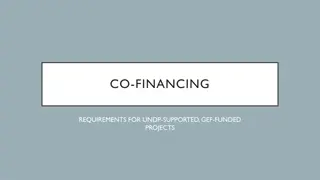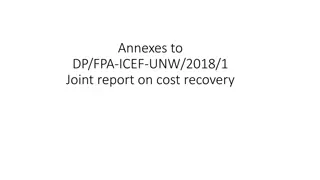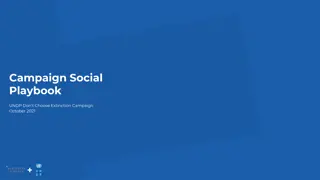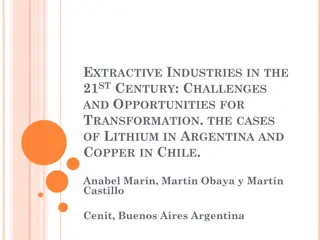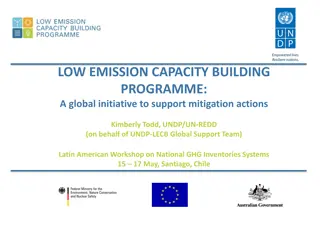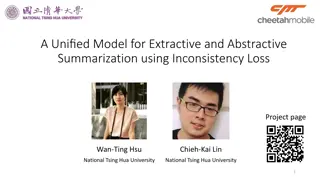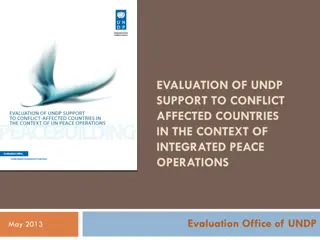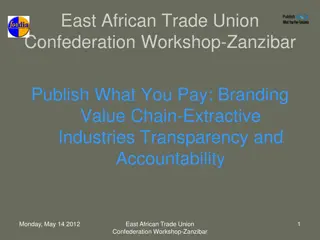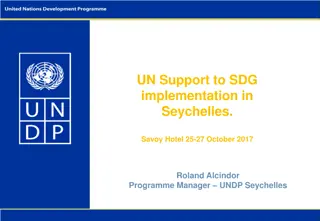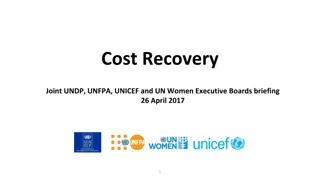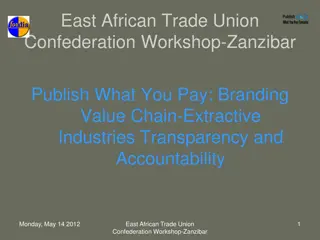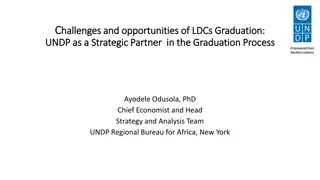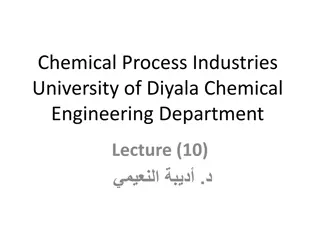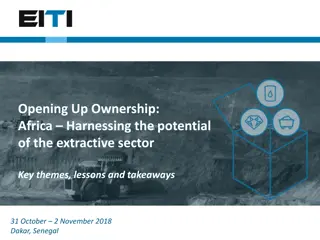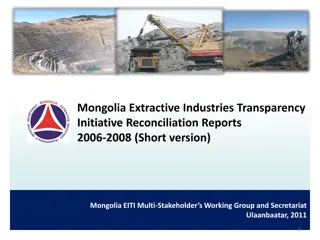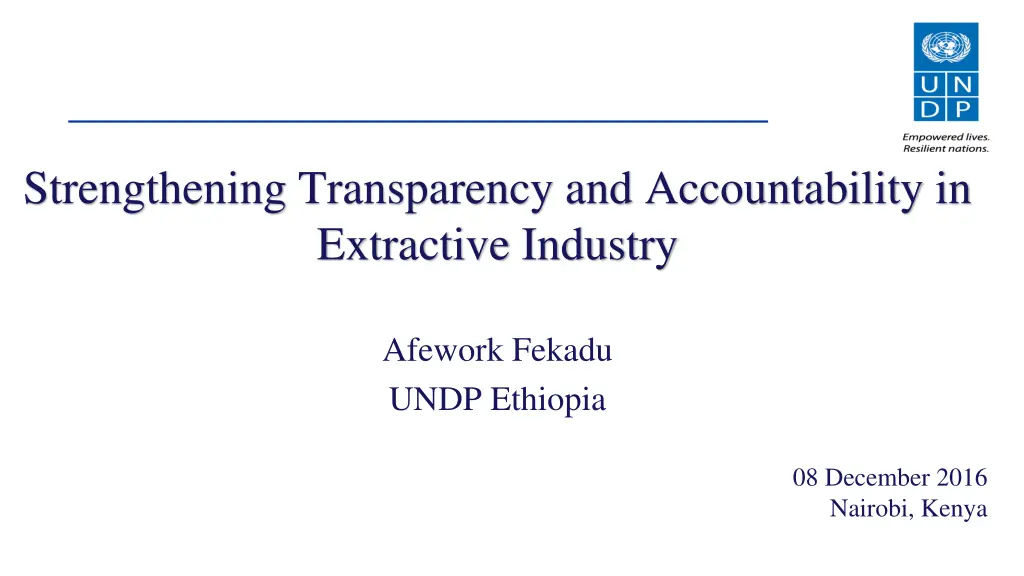
Strengthening Transparency and Accountability in Extractive Industry Initiatives
Learn how UNDP has been supporting the Extractive Industry Transparency Initiative in Ethiopia to enhance governance, transparency, and accountability, aiming to avoid the resource curse by optimizing the benefits of the sector through capacity building and policy dialogue.
Download Presentation

Please find below an Image/Link to download the presentation.
The content on the website is provided AS IS for your information and personal use only. It may not be sold, licensed, or shared on other websites without obtaining consent from the author. If you encounter any issues during the download, it is possible that the publisher has removed the file from their server.
You are allowed to download the files provided on this website for personal or commercial use, subject to the condition that they are used lawfully. All files are the property of their respective owners.
The content on the website is provided AS IS for your information and personal use only. It may not be sold, licensed, or shared on other websites without obtaining consent from the author.
E N D
Presentation Transcript
Strengthening Transparency and Accountability in Extractive Industry Afework Fekadu UNDP Ethiopia 08 December 2016 Nairobi, Kenya
Background/Introduction Extractive Industry is at early stage of its mining boom but on rising ; and has the opportunities to put in place policies, systems and mechanisms which ensure equitable distribution of mineral wealth before large revenue start flowing to the country The country is designing policies and strategies that can help to avoid the resource curse According to GTP II, the GoE has given due emphasis for the development of the mining sector Government is also keen to learn good and bad practices from other countries The mining sector development, inter alia, aimed to include: improving policy, legal framework, regulatory and working systems; enabling the mining sector to meet national and international environmental standards and regulations
UNDP Support to EEITI-Transparency Project UNDP has been supporting the MoM and EEITI through a project StrengtheningAccountability and Transparency in the Extractive Sector The Project has largely focused on three major areas o Enhancing the institutional capacity of the EEITI Secretariat to facilitate Multi- stakeholder oversight of the implementation of the EITI process o Strengthen capacity of federal, regional and local authorities to facilitate policy dialogue and community participation in view of EITI implementation o Enhancing capacity of non-state actors for policy dialogue and coordinated advocacy for transparency and accountability in the extractive sector
UNDP Support to EEITI-Transparency Project Objective of the Project: to optimize the benefits of the extractive industry supporting the national institutions to strengthen the governance, accountability and transparency of extractive industries The support to the national initiative is also a sign of commitment of UNDP to meet the rising demand of the country As witnessed from the national forum organized by UNDP and World Bank, it was remarked that there is a huge capacity gap in the country with regard to the extractive industry- this demand a capacity development and technical assistance
Major Achievements The EEITI Annual Activity Report has been produced, published and disseminated in accordance with the scope of the Global EITI standard-dissemination was led by the national coordination Reconciliation Report is finalized and submitted in March 2016 Oversight to many mining areas was conducted by the MSG and EEITI secretariat (undertaking Effective oversight by the MSG is one of the major criteria for a country to comply the global EITI requirement) Awareness of stakeholders on EITI raised Awareness creation Training undertaken in four regions- Afar, Benshangul, SNNP & Oromia (aimed to promote stakeholder engagement). More than 1,000 stakeholders attended the workshop
Major Achievements EEITI Communication strategy published in 2015- It s a broad policy framework on the why and how to increase awareness of activities in the extractive industries on the EITI platform Study on Mining Inventory has been conducted in the Country, covering 8 Regional States) and study document published and disseminated Development of MSG-CSO Charter for effective participation and policy dialogue within the MSG that serve as a code of principle for engagement and the work has been started: CSOAction Plan
KeyChallenges Shortage of Resources/funding Despite a lot of efforts , resource mobilization has been one of the critical challenge CSO engagement still remained a challenge for effective implementation of the initiative: CSO Proclamation remains a significant hurdle to CSO engagement in the EITI process Coordination among CSO representatives on the MSG has been poor and less effective: CSO need to be assertive
Need for Future Support Technical and financial support towards reviewing and improving the mining policy and strategy, regulatory framework, (federal and regional states) Support on the development of systems and guidelines on CSO and community engagement on EITI process. Effective stakeholder engagement and coordination Support on the inclusion and implementation of some of the key issues and principles of the AMV in Ethiopia Support is also needed to strengthen the institutional and human capacity of the mining institutions and EEITI and to maintain the efforts towards attaining the EITI principles

